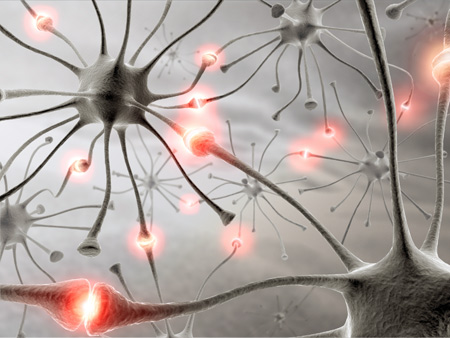To Find a Mockingbird
By Peter LloydNeuroscientists are beginning to understand how memory works. They can’t, however, tell you how to remember. But I can, because the recall process and one of the techniques you use to come up with great ideas are very similar. In both, you achieve success when you shut up and listen. I learned this in an unforgettable way.
What Neuroscientists Know
People who study memory tell us that the process is chemical. Memories are made of molecules. Electrical impulses jump across synapses, and the more times they leap, the easier it becomes for signals to cross the more-traveled synapses.
 Eventually some synapses become permanently bound together, creating an anatomical change in the brain.
Eventually some synapses become permanently bound together, creating an anatomical change in the brain.Your brain does not file sensations, words, images, or feelings like your electronic devices store data. Rather it makes nerve connections that create neurological networks when you pay attention in class, repeat a song often enough, or practice the xylophone day after day. These connections make it possible for you to recall as you associate items in the network with each other.
The retrieval process takes place unconsciously. Which is why you may find it difficult to remember something when you try to remember and easy when you stop trying. That’s because distractions can inhibit the recall process, including the distraction you create when you consciously try to remember.
What I Discovered
I was walking in my neighborhood early one chilly spring morning, thinking about something or other that prompted me to want to recall the name of the book To Kill a Mockingbird. I know the title, the author, and the principal characters, but I could not recall any of them. I skipped through scenes of the movie starring Gregory Peck—no help.
When I forget a name, I can usually recall it by going through the letters of the alphabet. I do this so often that I can recite Z through A as easily as I can recite A through Z. This time I started with A and bam! Atticus Finch! My brain obviously associates A with Atticus. But no other characters, the author, or the title came to mind.
Desperately frustrated, I eventually allowed my unconscious to help me out. Instead of drilling deeper around where I was failing to strike, I simply stopped working on the problem consciously and paid attention to whatever came to mind. Oddly the first idea that rose to the surface was “heart.” Heart? Yes, Harper Lee! Of course, there must be some homonym-like connection, at least in my brain, between heart and Harper!
Delighted with my success, I continued to listen. “Numbers,” came to mind. Not particular numbers but just the idea of numbers. Nothing... So I began to count. One... Nothing. Two... To Kill a Mockingbird!
I swear that’s how it happened.
Memory and Creativity
People who study creativity know that the unconscious plays an important part in coming up with breakthrough ideas. Now I know it can help me remember. Your brain knows how to find your memories. I recently learned to let my brain help me find mine.
And so it is with solutions to problems. After a break or a good night’s sleep, your unconscious may very well hold a solution. Don’t let the distractions of life and especially those of your conscious thinking get in the way.
Recall, like inspiration, is very polite. It never interrupts.
See also: How Memory Works Diagram by Online Colleges
Peter Lloyd is co-creator with Stephen Grossman of Animal Crackers, the breakthrough problem-solving tool designed to crack your toughest problems.
Right Brain Workouts Explained
